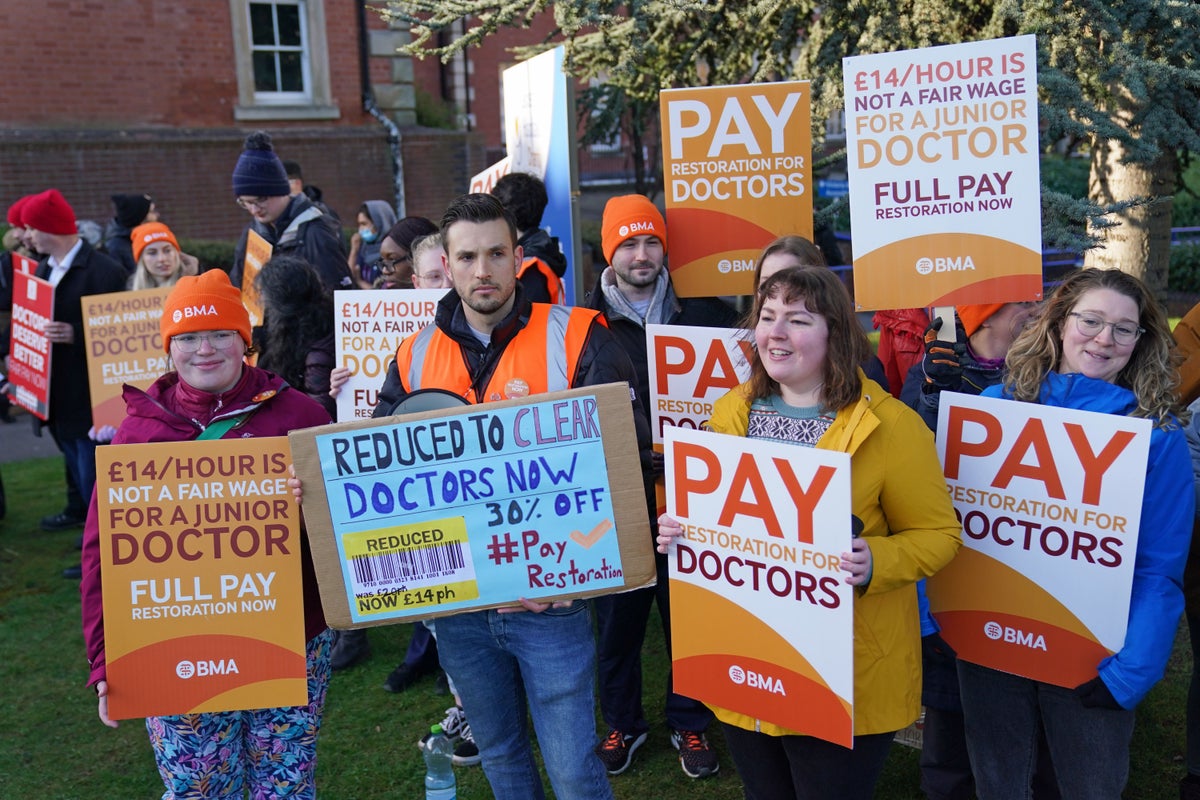
NHS health chiefs say they are “fed up” with the “permanent crisis” of strikes and warn this week’s junior doctors’ walkout will cost the NHS well over £100 million.
Health bosses are “frustrated” at the ongoing industrial action and say hospitals are struggling to get staff to cover shifts, while tens of thousands of appointments and surgeries will be cancelled each day.
It comes after months of nurses’ strikes, while junior doctors will take action from Wednesday for five days, followed by NHS consultants and then radiographers.
NHS forecasts for the first three-day doctors’ strikes showed the costs of covering shifts and the loss of payments for cancelled operations amounted to £100 million across all 215 NHS trusts. Health bosses now fear the five-day strike could cost almost double.
A group of three hospitals in London St George’s, Epsom and St Helier hospitals, warned the latest walkout, which will run over the weekend and into Monday, could be the “toughest yet”.
NHS medical director Dr Stephen Powis has warned tens of thousands of patient appointments and operations will be cancelled each day due to the action.
The warnings come as a survey of health leaders by NHS Providers, which represents trusts, revealed one-third of hospital chiefs are not confident they will meet promises made by prime minister Rishi Sunak to cut NHS waiting lists.
One hospital chief in the south of England warned ahead of the strikes: “It is annual leave season and we are loathe to cancel leave as this is now becoming a ‘perma crisis’ and we are conscious of avoiding staff burnout.”
“We are now covering the weekend which is more challenging … Staff [are] feeling that the Department of Health attitude that industrial action won’t impact on the elective recovery plan is beginning to lack authenticity and lose the locker room.”
They warned it has been harder to find staff to cover junior doctors’ shifts as “they feel there is no end in sight and they are trying to manage their own wellbeing”.
According to a report by NHS Providers, more than a third of trusts are not confident they will hit the government’s target to eliminate the number of patients waiting more than a year for care by March 2025.
It also showed no confidence the NHS will be able to meet other targets, including having 75 per cent of patients urgently referred for suspected cancer diagnosed or cancer ruled out within 28 days.
A third also said they were either very unlikely or unlikely to hit targets for 76 per cent of patients to be seen within four hours in A&E.
Sir Julian Hartley, chief executive of NHS Providers said: "We are now seeing an impact on productivity and cost in terms of strike action.”
"Some of the biggest trusts saw a cost of £2.5 to £3 million. Scaling up to all trusts, that is a reported cost of £100 million for the April strikes alone."
"There’s a high level of frustration and deep concern that there doesn’t appear to be a resolution in sight. The consequences of ongoing industrial on patient waits and on staff morale, and indeed the mounting costs of strike action is something that we just can’t allow to become business as usual.”
One NHS chief said: “So it’s costing us close to a million pounds each time there’s a three-day strike. So add that up, across, each time we have a strike across the country, there’s an awful lot of money being lost to this process.
They added: “I don’t think you can underestimate the tensions, and the potential with this good division that this creates, between obviously leaders, and staff, but also among staff themselves.”
Another said: “It’s cost us circa a million for each [strike], and actually, that was each three-day strike. So you could do the math on five days … I’m really worried about the kind of long-term damage it does to relationships within the NHS ... I’m fed up of industrial action.”
Health and Social Care Secretary Steve Barclay said: “It is disappointing that the BMA is going ahead with further strike action. This five-day walkout by junior doctors will have an impact on thousands of patients, put patient safety at risk and hamper efforts to cut NHS waiting lists.”







